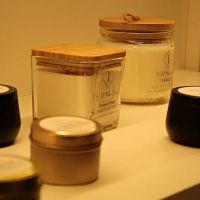Are Scented Candles Harmful to Pets?
- 1. Introduction
- 2. Dangers of Scented Candles for Pets
- 3. Health Risks for Different Pets
- 4. Types of Scented Candles to Avoid
- 5. How to Safely Use Candles When You Have Pets
- 6. Alternatives to Scented Candles for a Pet-Friendly Home
- 7. Conclusion
1. Introduction
Scented candles are a popular way to enhance the ambiance in homes, providing pleasant aromas that can help relax and rejuvenate the atmosphere. However, many pet owners may not realize that these seemingly harmless household items can be dangerous for their furry friends. Pets, particularly cats and dogs, have a much more sensitive sense of smell than humans, making them more vulnerable to certain chemicals and fragrances present in scented candles.
This article explores whether scented candles can be harmful to pets, the potential health risks involved, and how to keep your home safe for your animals while still enjoying a scented atmosphere. Whether you are a new pet owner or a seasoned one, it’s important to know how to balance your love for candles with the safety and well-being of your pets.
2. Dangers of Scented Candles for Pets
While scented candles can fill a room with a pleasant fragrance, they often contain harmful ingredients that can pose risks to pets. The dangers associated with scented candles come from the ingredients used in the candles, the wicks, and the smoke produced when they are burned. These factors can be toxic to animals, potentially leading to severe health issues.
2.1 Toxic Chemicals
Scented candles often contain synthetic fragrances, dyes, and chemicals that are used to create the desired scent. These ingredients can release harmful fumes when burned. One of the most common toxic chemicals found in candles is formaldehyde, a known carcinogen. When burned, these chemicals can create toxic fumes that can irritate your pet's respiratory system, eyes, and skin.
2.2 Inhalation of Smoke
Even if the candle is made with natural ingredients, the smoke produced when burning can still be harmful to your pet. Just like humans, pets can suffer from respiratory distress if exposed to excessive smoke. This is particularly dangerous for pets with pre-existing health conditions such as asthma or other respiratory issues.
id="Health-Risks-for-Different-Pets">3. Health Risks for Different Pets
The health risks associated with scented candles vary based on the type of pet you have. Different animals have different sensitivities to various ingredients, making it important to understand how specific pets may react to exposure to candles.
3.1 Dogs
Dogs are particularly sensitive to the chemicals used in scented candles. Some pets may exhibit allergic reactions such as sneezing, coughing, or watery eyes. In more severe cases, exposure to toxic fumes may lead to vomiting or diarrhea. Pets with breathing problems, such as brachycephalic breeds like Bulldogs or Pugs, may suffer from more pronounced symptoms, making scented candles a bigger concern in these cases.
3.2 Cats
Cats, with their highly sensitive respiratory systems, can also be at risk when exposed to the fumes from scented candles. Inhaling these chemicals can cause respiratory distress or exacerbate pre-existing conditions like feline asthma. Cats may also groom themselves and ingest harmful substances that have settled on their fur, leading to potential poisoning.
3.3 Other Pets
Other pets, such as rabbits, birds, or small rodents, can be even more sensitive to air pollutants from scented candles. Birds, in particular, are very sensitive to airborne toxins, and the fumes from scented candles can lead to respiratory failure or death. Small mammals like guinea pigs and hamsters are also at risk from inhaling smoke or fumes.
4. Types of Scented Candles to Avoid
While some scented candles are marketed as being natural or non-toxic, it’s still important to read labels and understand what ingredients are used in the products. Here are some types of candles you should avoid if you have pets:
4.1 Paraffin Wax Candles
Paraffin wax is a common base for many scented candles, but it’s made from petroleum, and when burned, it releases harmful substances like benzene and toluene into the air. These substances are known to be carcinogenic and can significantly affect both humans and pets.
4.2 Synthetic Fragrance Candles
Candles that contain synthetic fragrances may seem appealing due to their wide range of scents, but they often contain phthalates and other chemicals that can be toxic when inhaled by pets. Opt for candles with natural essential oils if you want to avoid these risks.
4.3 Lead Wicks
Although rare today, some older candles may still have wicks containing lead. Burning these candles can release harmful lead fumes into the air, posing serious health risks to both humans and pets. Always ensure that the candles you buy have lead-free wicks.
5. How to Safely Use Candles When You Have Pets
If you love using scented candles but want to protect your pets, there are ways to safely enjoy them. Here are some tips for using candles without exposing your pets to harm:
5.1 Choose Natural Candles
Look for candles made from natural ingredients like soy, beeswax, or coconut wax. These types of candles produce less soot and fewer toxic fumes. Additionally, opt for candles with essential oils, which tend to be safer than synthetic fragrances.
5.2 Keep Candles in Well-Ventilated Areas
If you burn candles, make sure they are placed in a well-ventilated area. This will help minimize the concentration of fumes in the air. Avoid burning candles in rooms where your pets spend a lot of time.
5.3 Never Leave Candles Unattended
Always keep a close eye on burning candles, especially if your pets are around. Pets, particularly dogs and cats, may try to investigate the flames or knock over candles, which could result in burns or fires.
6. Alternatives to Scented Candles for a Pet-Friendly Home
If you’re looking for a safer way to add pleasant scents to your home, there are several alternatives to scented candles that won’t harm your pets:
6.1 Essential Oil Diffusers
Essential oil diffusers use water and essential oils to release a scent into the air without producing harmful smoke. However, be cautious as some essential oils can be harmful to pets, so always check that the oils are pet-safe.
6.2 Pet-Friendly Air Fresheners
There are air fresheners available specifically designed to be safe for pets. These products use natural ingredients like herbs and flowers to freshen the air without exposing your pets to harmful chemicals.
6.3 Natural Herbs and Potpourri
For a completely pet-safe option, consider using dried herbs like lavender, chamomile, or mint. These natural aromas can provide a pleasant scent without any of the risks associated with burning candles.
7. Conclusion
Scented candles can provide a lovely fragrance to your home, but they come with potential risks when it comes to your pets. The chemicals in synthetic candles, the smoke produced, and the toxicity of certain ingredients can cause health problems for dogs, cats, and other pets. By choosing natural, non-toxic candles and using them carefully, you can still enjoy the ambiance they provide without compromising your pets’ well-being.
If you're looking for safe alternatives to scented candles, there are plenty of pet-friendly options available. Take the time to make informed decisions about the products you use in your home to create a safe environment for your furry friends. To discover pet-safe scented products, visit Scent Snob for a variety of pet-friendly options!



0 comments